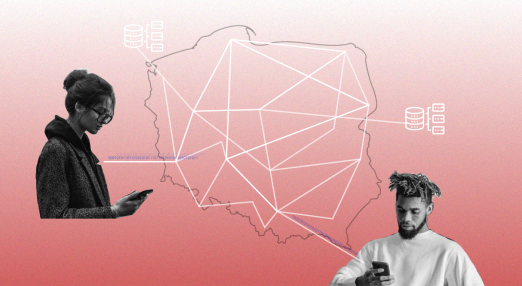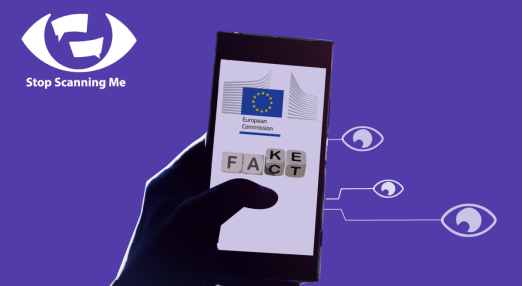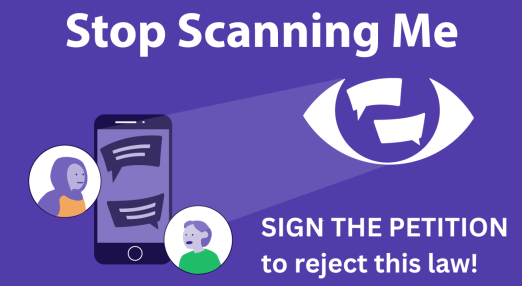Our work
EDRi is the biggest European network defending rights and freedoms online. We work to to challenge private and state actors who abuse their power to control or manipulate the public. We do so by advocating for robust and enforced laws, informing and mobilising people, promoting a healthy and accountable technology market, and building a movement of organisations and individuals committed to digital rights and freedoms in a connected world.
Filter resources
-

Poll: Young people in 13 EU countries refuse surveillance of online communication – Press Release
According to the results of the survey, 80% of young people aged 13 to 17 years old from 13 EU Member States would not feel comfortable being politically active or exploring their sexuality if authorities were able to monitor their digital communication, in order to look for child sexual abuse.
Read more
-

Position Paper: EU’s proposed health data regulation ignores patients’ privacy rights
EDRi’s new position paper outlines how the European Commission’s proposal for a European Health Data Space, in an attempt to make use of people’s health data, would sabotage the rights of patients to make decisions about their private medical information.
Read more
-

Poland: the government declares no further extension of data retention obligation
Data retention obligation will not be further extended in Polish law on electronic communication. However, the current, unlawful scope of telecommunication data retention remains unchanged.
Read more
-

Czech online state services without Google Analytics: thanks to IuRe
The Czech organisation Iuridicum Remedium (IuRe) sent an open letter to the Ministry of Health in June 2021. It was mainly about the vaccination system, but its impact is much bigger: many state websites are getting rid of Google Analytics and thus taking more account of user privacy.
Read more
-

European Commission must have greater ambition in combating sexual violence
Last year, the European Commission made a far-reaching proposal to protect children against sexual violence. But a study by Delft University shows that there is a lot wrong with the substantiation of the proposal.
Read more
-

EDRi-gram, 1 March 2023
In this edition of the EDRi-gram, we celebrate the success of EDRi’s member in the Czech Republic against the use of Google analytics in state services. We are also exploring the consequences of internet restrictions for people imposed by the Turkish government to silence criticism. You will also find the Stop Scanning Me movement’s recently launched petition enabling people to fight against the European Union's attempt to scan every move we make online. Join us!
Read more
-

Internet restrictions in Turkey violate fundamental rights
After the major earthquake that took place in Turkey on 6 February, covering 10 provinces and a population of approximately 15 million, bandwidth restriction for social media platforms such as Twitter and Tiktok was implemented. Whenever the current government was criticised for not meeting its obligations, throttling was used as an option to filter and prevent the flow of information.
Read more
-

The secret services’ reign of confusion, rogue mayors, racist tech and algorithm oversight (or not)
Have a quick read through January’s most interesting developments at the intersection of human rights and technology from the Netherlands.
Read more
-

Petition: Children deserve a secure and safe internet
Join us in our fight against the EU's attempt to scan every move we make online. Sign the petition.
Read more
-

2023: Important consultations for your Digital Rights!
Public consultations are an opportunity to influence future legislation at an early stage, in the European Union and beyond. They are your opportunity to help shaping a brighter future for digital rights, such as your right to a private life, data protection, or your freedom of opinion and expression.
Read more
-

PEGA Committee must call for an EU-wide ban on spyware
The European Parliament’s inquiry committee on Pegasus and other similar spyware (PEGA) is working on a set of recommendations for the regulation of the use of intrusive spyware by EU Member States. It is still unclear whether the Committee will dare to set vitally needed red lines and call for a sufficiently protective European Union-wide framework against spyware in its non-binding report. EDRi submitted amendments to strengthen the demands for the protection of affected people and democratic values.
Read more
-

EU to provide training on “covert techniques” to abusive police forces
The European Police College is to train a host of states with miserable human rights records on the use of “covert techniques in forensics and mobile telecommunications” and will provide “training activities related to cyber-attacks in order to build capacities for law enforcement, judicial authorities and other relevant bodies.”
Read more
